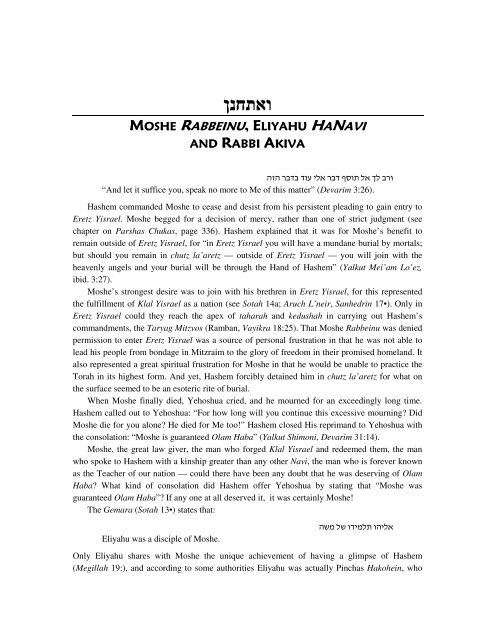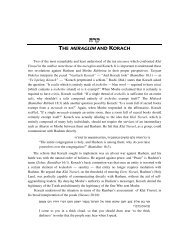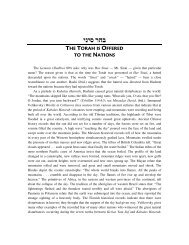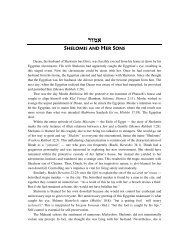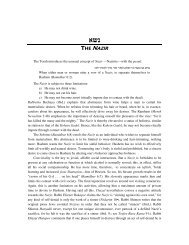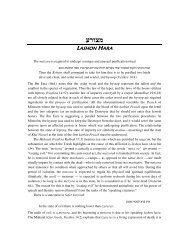Moshe Rabbeinu, Eliyahu Hanavi and Rabbi Akiva - Parsha ...
Moshe Rabbeinu, Eliyahu Hanavi and Rabbi Akiva - Parsha ...
Moshe Rabbeinu, Eliyahu Hanavi and Rabbi Akiva - Parsha ...
You also want an ePaper? Increase the reach of your titles
YUMPU automatically turns print PDFs into web optimized ePapers that Google loves.
ואתחנן<br />
MOSHE RABBEINU, ELIYAHU HANAVI<br />
AND RABBI AKIVA<br />
ורב לך אל תוסף דבר אלי עוד בדבר הזה<br />
“And let it suffice you, speak no more to Me of this matter” (Devarim 3:26).<br />
Hashem comm<strong>and</strong>ed <strong>Moshe</strong> to cease <strong>and</strong> desist from his persistent pleading to gain entry to<br />
Eretz Yisrael. <strong>Moshe</strong> begged for a decision of mercy, rather than one of strict judgment (see<br />
chapter on <strong>Parsha</strong>s Chukas, page 336). Hashem explained that it was for <strong>Moshe</strong>’s benefit to<br />
remain outside of Eretz Yisrael, for “in Eretz Yisrael you will have a mundane burial by mortals;<br />
but should you remain in chutz la’aretz — outside of Eretz Yisrael — you will join with the<br />
heavenly angels <strong>and</strong> your burial will be through the H<strong>and</strong> of Hashem” (Yalkut Mei’am Lo’ez,<br />
ibid. 3:27).<br />
<strong>Moshe</strong>’s strongest desire was to join with his brethren in Eretz Yisrael, for this represented<br />
the fulfillment of Klal Yisrael as a nation (see Sotah 14a; Aruch L’neir, Sanhedrin 17•). Only in<br />
Eretz Yisrael could they reach the apex of taharah <strong>and</strong> kedushah in carrying out Hashem’s<br />
comm<strong>and</strong>ments, the Taryag Mitzvos (Ramban, Vayikra 18:25). That <strong>Moshe</strong> <strong>Rabbeinu</strong> was denied<br />
permission to enter Eretz Yisrael was a source of personal frustration in that he was not able to<br />
lead his people from bondage in Mitzraim to the glory of freedom in their promised homel<strong>and</strong>. It<br />
also represented a great spiritual frustration for <strong>Moshe</strong> in that he would be unable to practice the<br />
Torah in its highest form. And yet, Hashem forcibly detained him in chutz la’aretz for what on<br />
the surface seemed to be an esoteric rite of burial.<br />
When <strong>Moshe</strong> finally died, Yehoshua cried, <strong>and</strong> he mourned for an exceedingly long time.<br />
Hashem called out to Yehoshua: “For how long will you continue this excessive mourning? Did<br />
<strong>Moshe</strong> die for you alone? He died for Me too!” Hashem closed His reprim<strong>and</strong> to Yehoshua with<br />
the consolation: “<strong>Moshe</strong> is guaranteed Olam Haba” (Yalkut Shimoni, Devarim 31:14).<br />
<strong>Moshe</strong>, the great law giver, the man who forged Klal Yisrael <strong>and</strong> redeemed them, the man<br />
who spoke to Hashem with a kinship greater than any other Navi, the man who is forever known<br />
as the Teacher of our nation — could there have been any doubt that he was deserving of Olam<br />
Haba? What kind of consolation did Hashem offer Yehoshua by stating that “<strong>Moshe</strong> was<br />
guaranteed Olam Haba”? If any one at all deserved it, it was certainly <strong>Moshe</strong>!<br />
The Gemara (Sotah 13•) states that:<br />
<strong>Eliyahu</strong> was a disciple of <strong>Moshe</strong>.<br />
אליהו תלמידו של משה<br />
Only <strong>Eliyahu</strong> shares with <strong>Moshe</strong> the unique achievement of having a glimpse of Hashem<br />
(Megillah 19:), <strong>and</strong> according to some authorities <strong>Eliyahu</strong> was actually Pinchas Hakohein, who
learned Torah directly from <strong>Moshe</strong> (Pirkei D’Rebbe Eliezer 47). Yet, Rashi (Sotah 13•) interprets<br />
the aforementioned quote strangely:<br />
Not that he (<strong>Eliyahu</strong>) actually learned directly from him (<strong>Moshe</strong>), but that the<br />
Torah of <strong>Moshe</strong> was taught to <strong>Eliyahu</strong>.<br />
Obviously, Rashi is referring to a much deeper bond between <strong>Moshe</strong> <strong>and</strong> <strong>Eliyahu</strong>; after all the<br />
entire nation was (<strong>and</strong> still is being) taught “the Torah of <strong>Moshe</strong>.” There is something so unique<br />
<strong>and</strong> important in the bond between these two men that it is only alluded to in cryptic fashion by<br />
the above Gemara.<br />
The Yalkut Shimoni (Mishlei 9) reveals a fascinating episode involving <strong>Eliyahu</strong> <strong>Hanavi</strong> <strong>and</strong><br />
<strong>Rabbi</strong> <strong>Akiva</strong>. The Yalkut states that <strong>Rabbi</strong> <strong>Akiva</strong> was not buried after he was tortured by the<br />
Romans, but that he was thrown onto a bed <strong>and</strong> was then carried to a cave by <strong>Eliyahu</strong> <strong>Hanavi</strong> <strong>and</strong><br />
<strong>Rabbi</strong> Yehoshua. <strong>Eliyahu</strong>, who is a Kohein, then personally involved himself with <strong>Rabbi</strong> <strong>Akiva</strong>’s<br />
body, explaining that the body of a talmud chacham does not defile. In order to properly<br />
underst<strong>and</strong> <strong>Moshe</strong> <strong>Rabbeinu</strong> <strong>and</strong> <strong>Eliyahu</strong> <strong>Hanavi</strong>, it is imperative to underst<strong>and</strong> <strong>Rabbi</strong> <strong>Akiva</strong>.<br />
The Gemara very vividly describes the last earthly moments of the life of <strong>Rabbi</strong> <strong>Akiva</strong>:<br />
בשעה שהוציאו את רבי עקיבא להריגה, זמן ק"ש היה, והיו סורקין את בשרו במסרקות של<br />
ברזל, והיה מקבל עליו עול מלכות שמים אמרו לו תלמידיו: רבינו עד כאן? א"ל כל ימי הייתי<br />
מצטער על פסוק זה "בכל נפשך" אפילו נוטל את נשמתך. אמרתי מתי יבוא לידי ואקיימנו,<br />
ועכשיו שבא לידי לא אקיימנו" היה מאריך ב"אחד" עד שיצתה נשמתו ב"אחד"<br />
The time at which the Romans took out <strong>Rabbi</strong> <strong>Akiva</strong> to murder him coincided<br />
with the prescribed time for the recitation of the Kerias Shema. They raked his<br />
flesh with combs of iron. At that point, <strong>Rabbi</strong> <strong>Akiva</strong> accepted the yoke of the<br />
Heavenly Kingdom (by the recitation of Kerias Shema). His students inquired of<br />
him “even to this extent?”; he responded that all his life he interpreted the phrase<br />
“with all your soul” to mean (that one must accept the yoke of Heaven) “even if<br />
they take your soul. I wondered when I would have the opportunity for this<br />
demonstration. And now that I have the opportunity, should I not take advantage<br />
of it?” <strong>Rabbi</strong> <strong>Akiva</strong> prolonged the proclamation of “echad” <strong>and</strong> he expired with<br />
“echad” on his lips (Berachos 61:).<br />
<strong>Rabbi</strong> <strong>Akiva</strong> understood that the sanctification of Heaven was the only purpose for human<br />
existence. To the extent that the Romans attempted to destroy his corporeal being, <strong>Rabbi</strong> <strong>Akiva</strong><br />
declared his unity with Hashem for eternity. Upon witnessing this scene, the Heavenly angels<br />
cried out to Hashem: “This is Torah, <strong>and</strong> this is its reward?” They felt that <strong>Rabbi</strong> <strong>Akiva</strong>, the pious<br />
Torah sage, should not have been humiliated <strong>and</strong> tortured at his demise; he deserved a more<br />
comfortable death (ibid.). At this point, the Almighty consoled the angels with the statement<br />
“Praised are you, <strong>Rabbi</strong> <strong>Akiva</strong>, in that you are ‘prepared’ for the next world” (ibid.) (see<br />
Sanhedrin 47• with Rashi <strong>and</strong> Tosafos [46:]).<br />
This is reminiscent of the consolation Hashem offered Yehoshua regarding the demise of<br />
<strong>Moshe</strong> <strong>Rabbeinu</strong>. There was no question that <strong>Rabbi</strong> <strong>Akiva</strong>, like <strong>Moshe</strong> <strong>Rabbeinu</strong>, was deserving<br />
of Olam Haba, so what type of consolation did Hashem offer? The angels complained about the<br />
unfair punishment encountered by <strong>Rabbi</strong> <strong>Akiva</strong>, <strong>and</strong> Hashem responded with a seemingly<br />
irrelevant point: <strong>Rabbi</strong> <strong>Akiva</strong> was clearly deserving of Olam Haba even before his death.
Similarly in the Yom Kippur <strong>and</strong> Tisha Be’av prayer of the Asarah Harugei Malchus (Kinos<br />
21) the description of the passing of <strong>Rabbi</strong> <strong>Akiva</strong> is accompanied by the unusual declaration<br />
“Fortunate are you, <strong>Rabbi</strong> <strong>Akiva</strong>, your body has been purified with every type of purity.” Why<br />
was similar praise not used in reference to the other nine sages murdered by the Romans?<br />
Obviously, <strong>Rabbi</strong> <strong>Akiva</strong>’s death was unique, for there is a very subtle nuance to the phrase: “You<br />
are mezuman — prepared — for the next world.”<br />
The use of the word “mezuman” in Divine expression bears special significance <strong>and</strong><br />
relevance. This term certifies that the subject will enter the next world without undergoing the<br />
travails of Heavenly judgment (Tosafos, Kesubos 103: ; see Taanis 29a). Prior to entering the<br />
next world, one must undergo a terrifying <strong>and</strong> frightening judicial trial by the Heavenly court.<br />
Rabban Yochanan ben Zakkai confirms that this petrifying experience is more fearful than death<br />
itself or even the possibility of being dispatched to Geihinom. On his deathbed, Rabban Yochanan<br />
ben Zakkai expressed to his students his fear of the Heavenly trial, <strong>and</strong> only as an afterthought<br />
mentioned the fear of possibly being relegated to Geihinom (Berachos 28:). Hence, it is apparent<br />
that Hashem, in responding to the angels, certified that <strong>Rabbi</strong> <strong>Akiva</strong> would forgo the tribulations<br />
of the Heavenly tribunal (Magid Yosef 313).<br />
<strong>Rabbi</strong> <strong>Akiva</strong>’s life was portrayed to <strong>Moshe</strong> <strong>Rabbeinu</strong> in a prophetic vision, at the time <strong>Moshe</strong><br />
was prepared to accept the Torah. Upon witnessing <strong>Rabbi</strong> <strong>Akiva</strong>’s greatness, <strong>Moshe</strong> wondered<br />
why he, <strong>and</strong> not <strong>Rabbi</strong> <strong>Akiva</strong>, was chosen to receive the Torah on behalf of Klal Yisrael:<br />
“Hashem, You have such a great man as this (<strong>Rabbi</strong> <strong>Akiva</strong>), <strong>and</strong> yet You choose to give the<br />
Torah through me?” (Menachos 29:). To which Hashem responded:<br />
Be silent — this is My plan (ibid.).<br />
שתוק - כך עלה במחשבה לפני<br />
<strong>Moshe</strong> then asked to be shown <strong>Rabbi</strong> <strong>Akiva</strong>’s ultimate reward, <strong>and</strong> was then shown how <strong>Rabbi</strong><br />
<strong>Akiva</strong>’s flesh was being scraped off by iron rakes.<br />
<strong>Moshe</strong>, as did the angels, protested <strong>Rabbi</strong> <strong>Akiva</strong>’s treatment: “This is Torah, <strong>and</strong> this is its<br />
reward?” Again, Hashem comm<strong>and</strong>ed <strong>Moshe</strong>: “Be silent — this is My plan” (ibid.). (See<br />
Ramban, Shaar Ha’gmul, Kisvei HaRamban II, p. 275).<br />
To underst<strong>and</strong> all this dialogue regarding the apparent punishment of <strong>Rabbi</strong> <strong>Akiva</strong>, <strong>and</strong> also<br />
the apparent punishment of <strong>Moshe</strong> <strong>Rabbeinu</strong>, it is imperative to underst<strong>and</strong> the nature of<br />
existence. Absolute human existence is really only in the soul of man. The corporeal body, with<br />
which the soul is equipped in this world, is only an artificial veneer. The one hundred twenty<br />
years in which the soul exists in this world is only a small fraction of the spectrum of its<br />
existence. This world is only a phase through which the soul passes — the container employed in<br />
this rite of passage is the human body. When the soul continues on with its eternal journey to the<br />
next world, the excess baggage is discarded. In the next world, the true world, there is no need for<br />
a body (<strong>Rabbeinu</strong> Saadya Ga’on, Emunos Vedai’os). Hence, mortal death, the separation of the<br />
physical body from the soul, is the first essential step in preparation for the next world. The soul,<br />
which becomes tainted <strong>and</strong> sullied by sin in this corporeal world, must be painfully cleansed in<br />
the intense fire of Geihinom. The Heavenly tribunal, which the soul must face in order to<br />
determine how much cleansing is actually necessary, is a most indescribable ordeal in pain,<br />
anguish <strong>and</strong> trauma. Hence, any soul-cleansing which is possible in this world would alleviate
much more intense suffering in the next. The righteous may avoid some of the punishing<br />
cleansing of Geihinom by undergoing physical punishment in this world; in absolute terms, a task<br />
easier borne than Geihinom. The truly saintly, who are not tarnished by sin at all, may even avoid<br />
the grueling Heavenly tribunal <strong>and</strong> pass directly into the next world, avoiding Geihinom, the<br />
Heavenly tribunal, <strong>and</strong> even mortal death.<br />
If the mortal body is ordinarily merely clothing for the soul, the truly saintly, who elevate the<br />
nature of the mundane to the spiritual, incorporate the human body into the soul. Under such<br />
circumstances death is entirely unnecessary — for there is no need to separate the mundane from<br />
the spiritual, for that being has become all spiritual.<br />
<strong>Rabbi</strong> <strong>Akiva</strong> did not commence with Torah study until he was forty years old. Up to the age<br />
of forty his soul was soiled with pernicious sin. The saintliness that he engendered after age forty<br />
was so great that Hashem sought to help him avoid Geihinom <strong>and</strong> even the ordeal of trial. Hence,<br />
it was necessary for him to undergo this inhuman torture in order to cleanse his soul. When<br />
<strong>Moshe</strong> asked to see <strong>Rabbi</strong> <strong>Akiva</strong>’s reward, he was shown <strong>Rabbi</strong> <strong>Akiva</strong> being tortured; this was in<br />
fact a reward for <strong>Rabbi</strong> <strong>Akiva</strong>, for now he was “prepared for the next world” — without even<br />
having to undergo trial. It is now apparent that the Torah could not be given through <strong>Rabbi</strong> <strong>Akiva</strong><br />
because his soul on this earth was not totally pure — he still had to undergo certain purification<br />
rites. <strong>Moshe</strong>, on the other h<strong>and</strong>, was especially created in purity for the role of the Torah-giver<br />
(Sotah 12•) in accordance with Hashem’s plan.<br />
When <strong>Moshe</strong> cried out “This is Torah, this is its reward?” he was seeking Heavenly mercy<br />
(Midas Harachamim) for <strong>Rabbi</strong> <strong>Akiva</strong> instead of the fierce <strong>and</strong> stern judgment (Midas Hadin).<br />
Hashem had to silence <strong>Moshe</strong>, for the institution of Midas Harachamim would have foiled<br />
Hashem’s plan to purify <strong>Rabbi</strong> <strong>Akiva</strong> in this world. Similarly, Hashem ordered <strong>Moshe</strong> to desist<br />
from pleading for Midas Harachamim so that he could enter Eretz Yisrael. <strong>Moshe</strong>, too, was<br />
tainted by some sin (Bamidbar 20:12) <strong>and</strong> had to submit to an earthly purification rite in order to<br />
avoid the Heavenly tribunal <strong>and</strong> Geihinom. It is now clear that Hashem’s punishment for <strong>Moshe</strong><br />
was only for his own benefit; <strong>and</strong> the statement “You will join with the Heavenly angels, <strong>and</strong><br />
your burial will be through the H<strong>and</strong> of Heaven” signifies that <strong>Moshe</strong> was destined for the next<br />
world with his soul <strong>and</strong> body intact. This is precisely the consolation Yehoshua received from<br />
Hashem, who sought to end his excessive mourning. Yehoshua was informed that not only was<br />
<strong>Moshe</strong> saved from Geihinom, but that it would also be unnecessary for him to face the ferocious<br />
Heavenly tribunal.<br />
<strong>Rabbi</strong> <strong>Akiva</strong> <strong>and</strong> <strong>Moshe</strong> <strong>Rabbeinu</strong> were so saintly that after some slight mortal purification,<br />
their corporeal bodies assumed the purified spiritual state of the soul, <strong>and</strong> it was unnecessary to<br />
separate the body from the soul even in death. Hence, the Yalkut Shimoni (Mishlei 9) intimates<br />
that <strong>Rabbi</strong> <strong>Akiva</strong> left this world, bypassed the Heavenly tribunal, <strong>and</strong> directly entered the next<br />
world with his purified body <strong>and</strong> soul intact.<br />
We now underst<strong>and</strong> what the Gemara (Sotah 13•) intends with the statement: “<strong>Eliyahu</strong> was a<br />
disciple of <strong>Moshe</strong>.” Like <strong>Moshe</strong>, <strong>Eliyahu</strong> was so saintly <strong>and</strong> pure that he, too, would enter the<br />
next world directly with his soul <strong>and</strong> body intact. There was no need for <strong>Eliyahu</strong>’s soul to shed its<br />
body, for his body had forged a great spiritual alliance with his soul (Bereishis Rabbah 21:5).<br />
In this world of darkness, it is impossible for anyone to truly discern what is beneficial from<br />
what is potentially harmful. Loving kindness from Hashem is the hallmark of every act that
efalls mankind, but unfortunately it is not always recognized as such. <strong>Moshe</strong> did not underst<strong>and</strong><br />
that Hashem’s refusal to permit him entry to Eretz Yisrael was actually a deed of loving kindness.<br />
Similarly, he could not underst<strong>and</strong> the reason for the terrible tortures which befell <strong>Rabbi</strong> <strong>Akiva</strong>.<br />
However, in absolute terms this seemingly strict behavior on the part of Hashem was actually the<br />
greatest act of loving kindness.<br />
aA


